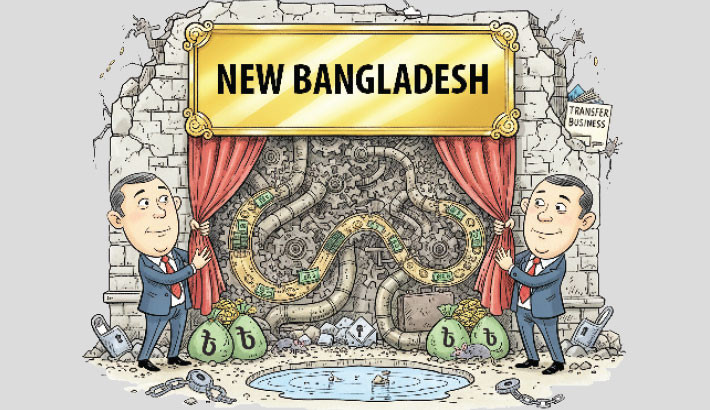WAYS TO STOP THE TRANSFER BUSINESS – PART II
Old corruption in ‘New Bangladesh’
Special Correspondent, Dhaka
Published: 16h ago

After the fall of the fascist Awami League government on 5 August 2024 amid a mass uprising, the journey towards a “New Bangladesh” began. Following that historic day, the call was made to build a new, inequality-free nation. In pursuit of peace and equality, reform initiatives were launched across all sectors, and several reform commissions were formed. Yet corruption has not stopped in this new Bangladesh. It continues unabated – just as before.
Over the past year and a half, the business of appointments and transfers has persisted. Even at the secretary level, allegations of bribery have surfaced over appointments and promotions.
The secretary of the Ministry of Public Administration was transferred amid accusations of irregularities and corruption in the appointment of deputy commissioners (DCs).
During this period, several sensational reports about the transfer trade were published in the media – none of which have been officially denied by the government.
The biggest scandal during this time erupted over the appointment of deputy commissioners. Ultimately, both the secretary and additional secretary of the Ministry of Public Administration were removed following allegations of corruption involving the appointment of the Chattogram DC.
Similar allegations had surfaced against the same official last year regarding transfer dealings. A cheque used for bribery was even leaked on social media.
Not only DC posts – one doctor reportedly issued a cheque worth Tk100 crore to become an adviser. There have also been allegations of bribery in the appointment of secretaries.
In the past year and a half, the trade in appointments and transfers has continued as before. Reports have also emerged of such practices in the postings of doctors and police officers, among others.
During this period, around 3,000 medical officers and 500 employees were transferred – an unprecedented reshuffle within such a short time.
Many transferred doctors did not even join their new workplaces at the district or upazila level. Instead, doctors with Awami League leanings were brought to Dhaka from the upazila level. As a result, healthcare services in rural areas were severely disrupted.
A report by a state intelligence agency revealed that a group of health department officials and employees, including leaders of the Doctors Association of Bangladesh (DAB), were involved in monetary transactions over these transfers.
The investigation identified the involvement of four officers and five employees of the department.
In the Ministry of Food, allegations have surfaced of financial transactions in the transfer of field-level officers in Mymensingh, Rajshahi, Chattogram and Khulna divisions – bypassing senior ministry officials.
The ministry has decided to investigate the matter and, in view of the upcoming Aman rice procurement campaign, has suspended all field-level transfers and postings until further notice.
An order issued on Monday, 3 November, stated that, to ensure the smooth and successful completion of the ongoing Aman procurement campaign and achieve its target, all field-level officers’ transfers and postings under the department would remain suspended until further instructions. This suspension also applies to acting officers of LSDs, managers of CSDs and superintendents of silos.
The Anti-Corruption Commission (ACC) has launched an investigation into allegations of a Tk10-crore transfer deal involving the chief conservator of forests in Chattogram.
ACC officials confirmed that the probe began after receiving specific complaints against Molla Rezaul Karim, chief conservator of forests for the Chattogram region.
On 9 January this year, 77 forest officers and employees were simultaneously transferred to their desired locations. It is alleged that large sums of money were exchanged for these transfers, amounting to about Tk10 crore in total. Around 700 government high school teachers, as well as staff from various educational institutions, offices and upazila education departments, were transferred. Among them, a reckless Deputy Director and his wealthy personal assistant (PA), named Faruk, have been accused of taking bribes. Allegedly, 70% of each bribe went to the deputy director and 30% to Faruk.
It is reported that most of these transfers were facilitated under the pretext of recommendations from BNP leaders and officials in the Ministry of Education – in reality orchestrated by this transfer-trading syndicate. Several staff members, including Faruk, have been accused of actively assisting the deputy director in the bribery scheme – a fact widely discussed among education cadre officials and employees.
Allegations of transfer trading have also surfaced in the police department. Bribery and political lobbying are reportedly rampant behind the posting and promotion of key officers, including officers-in-charge (OCs) of major police stations. There have even been reports of appointment trading in the position of Managing Director of WASA.
In short, the business of appointments and transfers has returned in its old form. Analysts believe this is the root of corruption in Bangladesh. Unless the appointment and transfer business is stopped, the people of the country will never be free from corruption.
Among the reforms initiated by the interim government, reforming the Anti-Corruption Commission (ACC) was one of the priorities. The commission has already submitted a set of recommendations.
However, experts argue that merely reforming the ACC will not stop corruption. According to them, unless the source of corruption is addressed, strengthening the ACC will achieve little.
To eliminate corruption from society, government institutions must first be freed from it – and to achieve that, the business of appointments and transfers must end.
If a sub-registrar or passport officer can hold office without paying a bribe, they will be motivated to serve the public.
But in the past year and a half, there has been no initiative to stop this entrenched system of appointment and transfer trading.

